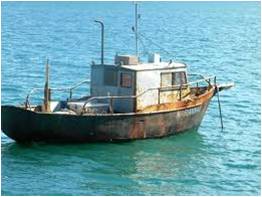 Skye Jethani is a Christian writer and thinker who earlier in the summer wrote a provocative series of articles titled, “How Churches Became Cruise Ships.” Jethani is insightful and the articles are worth reading. In the articles Jethani looks at the evolution of the great passenger ship from an ocean liner to a cruise ship. The ocean liner’s task was to move people from place to place – New York to London or Liverpool. The cruise ship’s task is to entertain people as they go in a grand circle – Fort Lauderdale to Fort Lauderdale with some islands in between. Jethani likens the contemporary mega-church to the floating hotel/vacation destination that is a cruise ship.
Skye Jethani is a Christian writer and thinker who earlier in the summer wrote a provocative series of articles titled, “How Churches Became Cruise Ships.” Jethani is insightful and the articles are worth reading. In the articles Jethani looks at the evolution of the great passenger ship from an ocean liner to a cruise ship. The ocean liner’s task was to move people from place to place – New York to London or Liverpool. The cruise ship’s task is to entertain people as they go in a grand circle – Fort Lauderdale to Fort Lauderdale with some islands in between. Jethani likens the contemporary mega-church to the floating hotel/vacation destination that is a cruise ship.
Thinking of the rise of the mega-church in the 1980s and 90’s, Jethani writes
…by starting with consumer’s desires they were mirroring the shift in passenger shipping away from liner voyages to cruising. They were making the church itself the destination rather than the vehicle. New jargon was even developed to articulate this shift. The goal was no longer connecting non-believers to God, but rather connecting the “unchurched” to our ministry.
Reframing the church as the destination triggered explosive growth in the size of congregations. Logic dictated that larger churches, like larger cruise ships, could offer consumers more choices to address their needs and desires. As a result, church growth went from a byproduct of the mission to its goal, and the programs and facilities churches incorporate today would have been unimaginable a few decades ago. Coffee shops, bookstores, health clubs, recreation centers, even auto mechanics and production studios. Just as modern cruise ships have redefined the passenger shipping, today’s megachurches have redefined our understanding of ministry. And like the cruise industry, megachurches have flourished.
LPC is not a mega-church and is very unlikely ever to be one. I for one am thankful for that. But if LPC is not a mega-church, then what is it? We’re not a ocean liner, the Titanic or the Queen Elizabeth. I think we’re a mail boat.
Mail boats (I’m thinking of something like the one pictured above), connect small ports with a larger port, usually once a week. They bring the mail and groceries and supplies to those living on a remote island or up a rocky coast. Once in a while friends and family members book passage on a mail boat to come and visit and renew relationships. And they carry letters and maybe some garden produce or the work of a local artisan from one stop to the next. There is nothing glamorous about the boat itself, they may be anything but glamorous, but their task is essential. Without them communication ends and food and supplies run low.
Yes, a mail boat, that’s what we are. LPC – an essential rust bucket. There’s an advertizing slogan for you.
Mail boat churches like LPC are essential for communication – the Word preached and encouraging news of God’s work in distant places comes by way of a mail boat church.
Mail boat churches bring essential supplies – the Bread and Wine of the Table, Sunday School curriculum for the children and study Bible for the adults.
Mail boat churches connect friends from other islands and allow those in one port to send news and gifts to those in another port who may be struggling just now.
Good for the mega-churches and the amazing things they do. I am so thankful to be a part of a mail boat church. God bless our rust bucket!
One of the realities of life in our time, though, is satellite TV available on almost every island and every little outpost on the rocky coast. Who needs a letter with news from the outside when you can watch the latest installment of Survivor on the flat screen? Why even bother coming down to the dock once a week when the mail boat arrives when you can stay home and watch The Bachelor or a preseason NFL game?
Even now the mail boat is essential.
The old rust bucket shows up once a week every week. I think we’d best be on the dock when it arrives.
See You Sunday,
